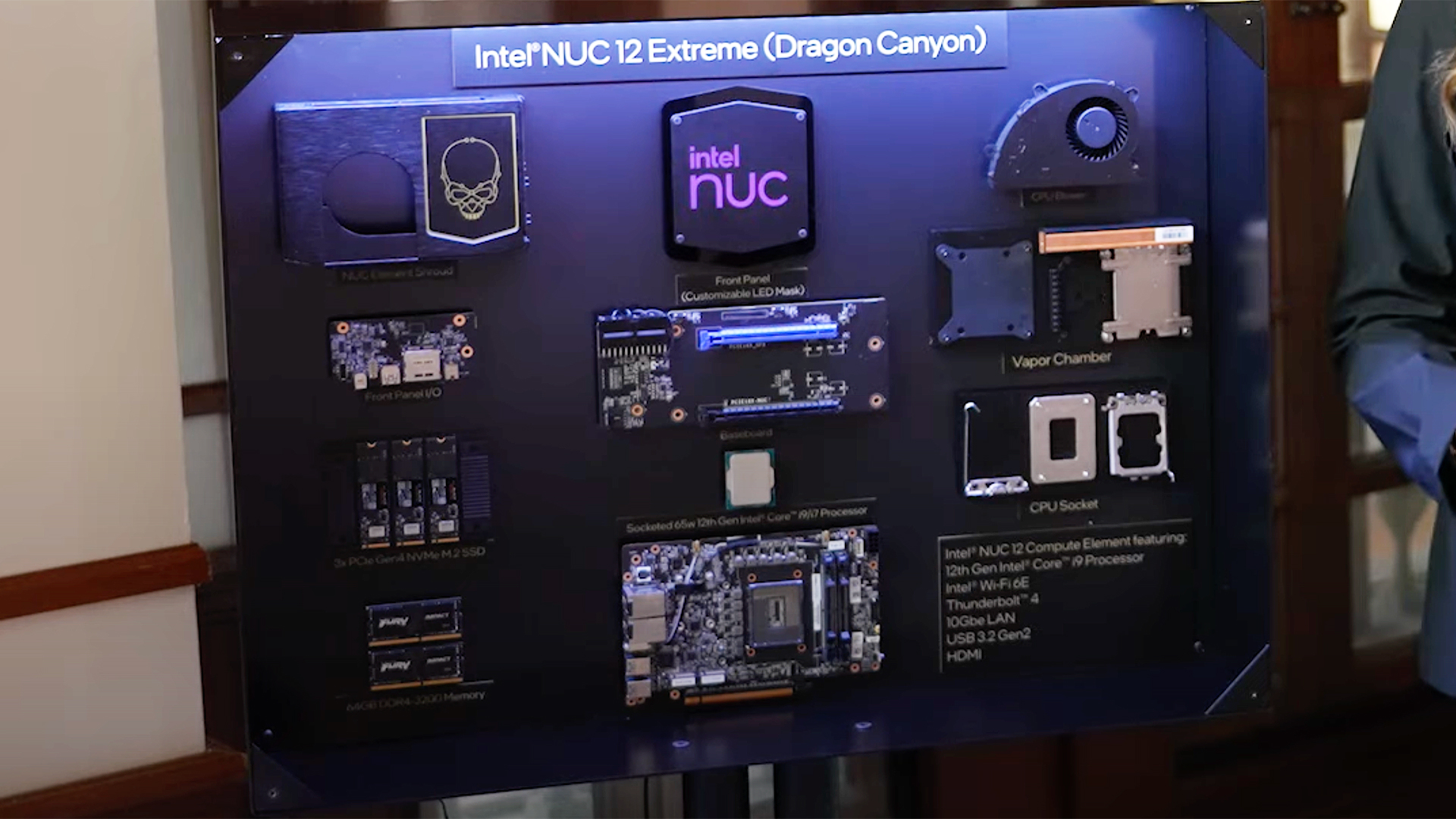Intel Fires Up 'Dragon Canyon' Alder Lake NUCs Priced From $1,500
Intel's next-generation NUC 12 Extreme set to be available soon.
A major value-added reseller of ultra-compact PCs briefly listed Intel's upcoming NUC 12 Extreme 'Dragon Canyon' desktops, revealing their prices and perhaps indicating that the new systems will be available sooner rather than later. Since the new NUCs for gamers and enthusiasts will use socketed Alder Lake CPUs, they will offer performance on par with full-size gaming desktops, but they will also cost more than their predecessors.
SimplyNUC accidentally listed Intel's NUC 12 Extreme Dragon Canyon desktops with Core i9 and Core i7 processors for perhaps a few minutes, but it was enough for @momomo_us to capture screenshots. Unfortunately, since the price list does not include any image of Intel's NUC 12 Extreme, it means that Intel has not yet supplied SimplyNUC with marketing materials covering Dragon Canyon.
As it turns out, Intel's top-of-the-range NUC12DCMi9 with a socketed Core i9-12900 processor will cost $1,714/€1,401, whereas slightly less potent Intel's NUC12DCMi7 with a Core i7-12700 chip will be priced at $1,514/€1,181, depending on where you buy. At least initially, it looks like Intel plans to offer NUC 12 Extreme systems equipped with processors and proprietary PSUs, but no other components. It is unclear whether the company will provide barebone machines.
As seen from SimplyNUC's price list, the new NUC 12 Extreme systems will be around $300/€220 more expensive than the current-generation NUC 11 Extreme PCs with built-in 11th Generation Core 'Tiger Lake' KB-series processors with eight cores. Assuming that the reseller does not try to charge extra for a highly anticipated product that promises to be in high demand, it looks like Intel intends to make its upcoming systems somewhat more expensive than their predecessors.
The key advantage of Intel's NUC 12 Extreme systems is their socketed processors, which will allow their owners to eventually upgrade their PCs with 13th Generation Core 'Raptor Lake' CPUs. Also, the same chassis promises to be compatible with Intel's forthcoming baseboard for NUC systems. So after Intel's next-generation platform, it will be possible to move on to Meteor Lake and Arrow Lake.
In addition, Intel's NUC 12 will support up to 64GB of DDR4-3200 memory using two SO-DIMMs (possibly up to 128GB with proper firmware and modules) and three M.2-2280 SSDs with a PCIe 4.0 x4 interface. The 65W socketed Alder Lake processors feature a custom cooling system featuring a vapor chamber and a blower fan.
As for connectivity, the system will offer a Wi-Fi 6E + Bluetooth adapter, a 10GbE network adapter (vs. 2.5GbE in case of NUC 11 Extreme), Thunderbolt 4 connectivity, USB 3.2 Gen 2 ports, and two built-in graphics output (DisplayPort 1.4 and HDMI 1.4) that will work with Intel's integrated GPU.
Get Tom's Hardware's best news and in-depth reviews, straight to your inbox.
Intel promised to start selling its NUC 12 Extreme systems in the first quarter, and SimplyNUC's listings seem to confirm this timing.

Anton Shilov is a contributing writer at Tom’s Hardware. Over the past couple of decades, he has covered everything from CPUs and GPUs to supercomputers and from modern process technologies and latest fab tools to high-tech industry trends.
-
cryoburner I don't really get the point of NUCs in this price range. They're priced like higher-end laptops, only without the portability and built-in peripherals to help justify paying a premium for the components they provide. There isn't much point in making a system so compact if it's not meant to be carried around. For something like a home theater PC or some business systems, an ultra-compact desktop PC might make some sense, but at a much lower price level than this.Reply
What good is offering CPU performance "on par with full-size gaming desktops" if it's paired with low-end integrated graphics that will be abysmal at gaming? They have some larger models that allow for a full-size dedicated graphics card to be installed, but that largely defeats the point of the form factor. You might as well go with mini or micro-ATX then. And judging by that site's pricing for their existing models, that $1,500+ for the i7 system will likely only get you a base model with 8GB of RAM, a 256GB SSD, integrated graphics and no OS. You'll have to pay significantly more for a usable amount of RAM and storage, Windows, and of course a graphics card if you intend on using the system for gaming.
Meanwhile, it's possible to get complete, name-brand gaming laptops on Amazon for around $1300 featuring an i7-11800H, 16GB of RAM, a 512GB SSD and dedicated RTX 3060/3070 (laptop) graphics hardware, along with Windows 10/11. And that's in addition to all the other standard features gaming laptops in that price range provide, like a built-in 144Hz 1080p display, a backlit keyboard and a battery. So more portability, and far better specs for gaming than the base-model NUC sold there. Sure, you could technically configure the NUC to have better specs than one of those gaming laptops, but that's likely to bring the price up into the $3000 range. -
VforV Any other kind of product that would have a human skull as a logo, would be considered ugly and dumb, but somehow if it's PC and tech it's "cool" or "ok" (for whatever the justification).... really?Reply
These logos depicting death are idiotic and anyone with a grain of common sense must see this. We are living in very aberrant times... -
Wyrmbane I guess they should have variants that look more professional rather than gamer-like or cool. But as for the death symbolism being idiotic or aberrant, to each his own - I mean people have been wearing crucifixes for centuries...Reply

